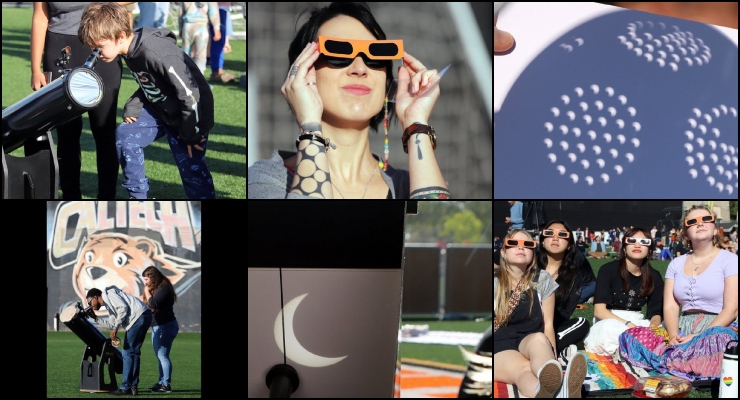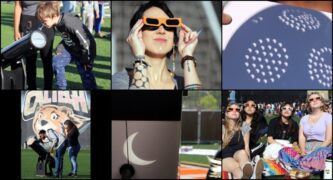
As the clock ticks down to April 8, astronomers and celestial enthusiasts alike are eagerly awaiting the arrival of the Great North American Eclipse, a total solar eclipse that promises to captivate millions across the continent. In and near Pasadena, two of the city’s most iconic astronomical institutions, the California Institute of Technology and the Mount Wilson Observatory, announced plans to host special viewing events, offering the public a once-in-a-lifetime opportunity to witness this heavenly marvel.
While Pasadena won’t be directly in the path of totality, where the moon completely blocks out the sun, the city will still be treated to a mesmerizing partial eclipse.
Astronomers predict that at the eclipse’s peak, which will occur at precisely 11:13 a.m. local time, the moon will obscure nearly half of the sun’s disk, casting an eerie twilight across the region.
Caltech has announced plans to host a solar eclipse viewing party at its Cahill Center for Astronomy and Astrophysics. From 10:00 a.m. to 12:00 p.m. on the day of the eclipse, attendees will have the chance to peer through solar telescopes, receive free eclipse glasses (while supplies last), and rub elbows with some of the institution’s top astrophysicists, who will be on hand to share their expertise and guide viewers through the experience.
“We will host a solar eclipse viewing party at the Cahill Center for Astronomy and Astrophysics and the adjacent space,” Caltech announced in a statement. “We’ll have solar telescopes, free eclipse glasses (as supplies last), and astrophysicists on hand to help everyone get the most out of this rare experience.”
This is a free event open to everyone. No reservations are needed. Stay only as long as you want.
For directions, parking, and more information, please visit: http://outreach.astro.caltech.
For more information, please contact Cameron Hummels by email at chummels@caltech.edu.
Not to be outdone, the historic Mount Wilson Observatory, perched high above the city in the San Gabriel Mountains, will also be opening its doors to the public for a special eclipse event. From 9:00 a.m. to 1:00 p.m., visitors can gather in the observatory’s auditorium to watch a live stream of the eclipse, captured through the facility’s state-of-the-art telescopes.
For more visit https://www.mtwilson.edu/
Pasadena Now expects an eclipse event at Pasadena City College but has been unable to obtain verification.
The Great North American Eclipse, as it’s been dubbed, will first make landfall on Mexico’s Pacific coast at around 11:07 a.m. PDT before embarking on a breathtaking journey across the United States.
The path of totality, a narrow band just 115 miles wide, will sweep through a dozen states, including Texas, Oklahoma, Arkansas, Missouri, Illinois, Kentucky, Indiana, Ohio, Pennsylvania, New York, Vermont, New Hampshire, and Maine, as well as parts of Tennessee and Michigan.
For those lucky enough to find themselves in the path of totality, the moon will completely block out the sun for a brief but unforgettable moment, plunging the landscape into an ethereal darkness and revealing the sun’s delicate corona, a sight that’s normally hidden from view.
The longest duration of totality, clocking in at a staggering 4 minutes and 27 seconds, will occur near the small town of Nazas, Durango, in Mexico.
After its U.S. tour, the eclipse will cross the border into Canada, traversing Southern Ontario, Quebec, New Brunswick, Prince Edward Island, and Cape Breton before bidding farewell to the continent on the Atlantic coast of Newfoundland.
This awe-inspiring celestial event is part of Saros cycle 139, a series of eclipses that repeats every 18 years and 11 days. Remarkably, the Great North American Eclipse will be the last total solar eclipse visible from the contiguous United States until August 22 and 23, 2044, making it an incredibly rare and precious opportunity for American sky watchers.
As anticipation builds for the eclipse, experts are urging observers to prioritize safety above all else. Looking directly at the sun without proper protection can cause irreversible eye damage, so it’s crucial to use certified solar eclipse glasses or filters to ensure a safe and enjoyable viewing experience.














 2 comments
2 comments


